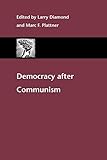Democracy after communism / edited by Larry Diamond and Marc F. Plattner.
Material type: TextLanguage: English Series: Journal of democracy bookPublication details: Baltimore, MD : Johns Hopkins University Press, c2002.Description: xxiv, 288 pages ; 23 cmISBN:
TextLanguage: English Series: Journal of democracy bookPublication details: Baltimore, MD : Johns Hopkins University Press, c2002.Description: xxiv, 288 pages ; 23 cmISBN: - 0801870763 (pbk. : alk. paper)
- 9780801870767 (pbk. : alk. paper)
- 306.2/09171/7
- JC 421 D383a 2002
| Item type | Current library | Home library | Collection | Shelving location | Call number | Copy number | Status | Date due | Barcode |
|---|---|---|---|---|---|---|---|---|---|
 Libro
Libro
|
Biblioteca Juan Bosch | Biblioteca Juan Bosch | Ciencias Sociales | Ciencias Sociales (3er. Piso) | JC 421 D383a 2002 (Browse shelf(Opens below)) | 1 | Available | 00000030358 |
Browsing Biblioteca Juan Bosch shelves, Shelving location: Ciencias Sociales (3er. Piso), Collection: Ciencias Sociales Close shelf browser (Hides shelf browser)

|

|

|

|

|

|

|
||
| JC 421 D383 2007 Democratizing democracy : beyond the liberal democratic canon / | JC 421 D383 2010 La démocratie : histoire, théories, pratiques / | JC 421 D383 2017 Demodiversidad : imaginar nuevas posibilidades democráticas / | JC 421 D383a 2002 Democracy after communism / | JC 421 D687c 1999 Cómo gobernar mañana? / | JC 421 D783f 1995 No title | JC 421 D923d 2005 Democracy : a history / |
Includes bibliographical references and index.
Acknowledgments vii
Introduction ix
Marc F. Plattner
I. The Exit from Communism
How Different Are Postcommunist Transitions?
3 (15)
Ghia Nodia
Comparing East and South
18 (15)
Valerie Bunce
The Persistence of Postcommunist Elites
33 (15)
John Higley
Judith Kullberg
Jan Pakulski
Civil Society after Communism
48 (15)
Aleksander Smolar
Understanding Postcommunist Transitions
63 (15)
Leszek Balcerowicz
Estonia's Success Story
78 (6)
Mart Laar
The Postcommunist Wars
84 (19)
Charles H. Fairbanks, Jr.
II. The East European Experience
The Postcommunist Divide
103 (6)
Jacques Rupnik
Europe Transformed
109 (6)
Richard Rose
Reassessing the Revolutions of 1989
115 (5)
Vladimir Tismaneanu
The Transformation of Central Europe
120 (6)
Bronistaw Geremek
Victory Defeated
126 (6)
G.M. Tamas
The International Context
132 (15)
Jacques Rupnik
A Diverging Europe
147 (14)
Richard Rose
History and Memory: The Revolutions of 1989--91
161 (18)
Aleksander Smolar
III. The Post-Soviet Experience
One Step Forward, Two Steps Back
179 (15)
Michael McFaul
The Primacy of History and Culture
194 (7)
Zbigniew Brzezinski
The Impact of Nationalism
201 (8)
Ghia Nodia
From Democratization to ``Guided Democracy,''
209 (7)
Archie Brown
The Advantages of Radical Reform
216 (8)
Anders Åslund
Disillusionment in the Caucasus and Central Asia
224 (8)
Charles H. Fairbanks, Jr.
Sovereignty and Uncertainty in Ukraine
232 (8)
Nadia Diuk
Russia's Hybrid Regime
240 (6)
Lilia Shevtsova
Putin's Path
246 (8)
M. Steven Fish
Going Backwards
254 (8)
Grigory Yavlinsky
A Mixed Record, an Uncertain Future
262 (9)
Michael McFaul
Index 271
The last quarter of the twentieth century was marked by two dramatic political trends that altered many of the world's regimes: the global resurgence of democracy and the collapse of communism. Was the process that brought down communism in Eastern Europe and the former Soviet Union fundamentally different from the process that gave birth to new democracies in other regions of the world? Were the transitions away from communism mostly like or mostly unlike the transitions away from authoritarianism that took place elsewhere? Is the challenge of building and consolidating democracy under postcommunist conditions unique, or can one apply lessons learned from other new democracies? The essays collected in this volume explore these questions, while tracing how the countries of Eastern Europe and the former Soviet Union have fared in the decade following the fall of communism.


There are no comments on this title.